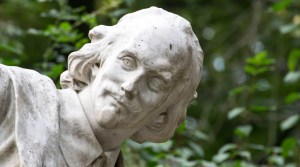Who would have thought that so much philosophy could be found in such little poetry? Who would have thought that so much could be said in so few words? Next time you read Shakespeare, read carefully, and you may find more philosophy than first meets the eye.
 We have recently celebrated the feast of Corpus Christi, and the beautiful hymns Adoro Te Devote and Pange Lingua still play in my memory. Saint Thomas Aquinas wrote these hymns, and through his concise yet graceful poetry we can glimpse his deep devotion to the Blessed Sacrament. Saint Thomas was the rare kind of person who wrote both great poetry and great philosophy. Plato might also be counted among the poet-philosophers, along with William Shakespeare. To be sure, everyone knows that Shakespeare was a great poet (they call him The Bard after all), but few people realize that The Bard was also a great philosopher.
We have recently celebrated the feast of Corpus Christi, and the beautiful hymns Adoro Te Devote and Pange Lingua still play in my memory. Saint Thomas Aquinas wrote these hymns, and through his concise yet graceful poetry we can glimpse his deep devotion to the Blessed Sacrament. Saint Thomas was the rare kind of person who wrote both great poetry and great philosophy. Plato might also be counted among the poet-philosophers, along with William Shakespeare. To be sure, everyone knows that Shakespeare was a great poet (they call him The Bard after all), but few people realize that The Bard was also a great philosopher.
Duane Berquist points out that an example of Shakespearean philosophy can be found in Hamlet, which contains a full definition of reason—no small feat, as not many philosophers have struck upon a definition of reason.
What is a man,
If his chief good and market of his time
Be but to sleep and feed? a beast, no more.
Sure, he that made us with such large discourse,
Looking before and after, gave us not
That capability and god-like reason
To fust in us unused. (4.4)
Shakespeare gives three components to the definition of reason: capability, large discourse, and looking before and after. First, like imagination, memory, and the five senses, reason is a capability for something. Thomas Aquinas is saying the same thing when he says that reason is a power of the soul. Calling reason a power of the soul simply means that reasoning is something that the soul can do. Yet merely calling reason a capability is not enough, because it does not differentiate reason from the soul’s other abilities.
The next two components (large discourse, and, looking before and after) home in on the precise definition. Reason proceeds by way of discourse, since, unlike God’s simple gaze, it must move from one thing to another. But this discourse is large, because it knows things both great and small: reason can know things as mundane as this morning’s coffee, but can also know things as sublime as the human soul and God. No other power of the soul has the ability to carry out such large discourse.
Finally, reason looks before and after, by observing and imposing order. Whenever there is before and after, there is order. We know that Aristotle agrees that ordering is reason’s special task since he says that “it belongs to the wise man to order.”
Reason, therefore, is a capability for large discourse, looking before and after. Ironically, Shakespeare places this most reasonable definition of reason on the lips of the mad prince Hamlet, who has lost his own reasoning power.
In this passage, Hamlet not only defines reason, but also exhorts us to live by it. He gives some good arguments. First, if man does not use reason, man is a beast no more. Second, since God gave man an ability to reason, he meant for man to use it, and not for it to fust (grow moldy) in us unused. Third, we should use reason because the exercise of reason is god-like. Reason makes man god-like insofar as reason allows man to know a bit of what God knows, albeit in an opposite order: God knows the cosmos through knowing himself, while man knows God through the cosmos.
When man uses his reason and follows it, the rest of his being is ordered and made perfect. In act three, Hamlet demands, “give me that man that is not passion’s slave.” When a person stops following reason, they become slaves to passion. When given free-reign, passion enslaves; reason, however, guides. Reason leads the passions as a father leads his son, not as a master leads a slave. A slave receives no benefit from the master, while a son shares in the good of the father—so that when reason leads the passions, it elevates them and legitimates them. Without the paternal guidance of reason, emotions are childish and stunted.
Who would have thought that so much philosophy could be found in such little poetry? Who would have thought that so much could be said in so few words? Next time you read Shakespeare, read carefully, and you may find more philosophy than first meets the eye.
✠
Republished with gracious permission from Dominicana (June 2025).
The Imaginative Conservative applies the principle of appreciation to the discussion of culture and politics—we approach dialogue with magnanimity rather than with mere civility. Will you help us remain a refreshing oasis in the increasingly contentious arena of modern discourse? Please consider donating now.
Photo by Tsungam












